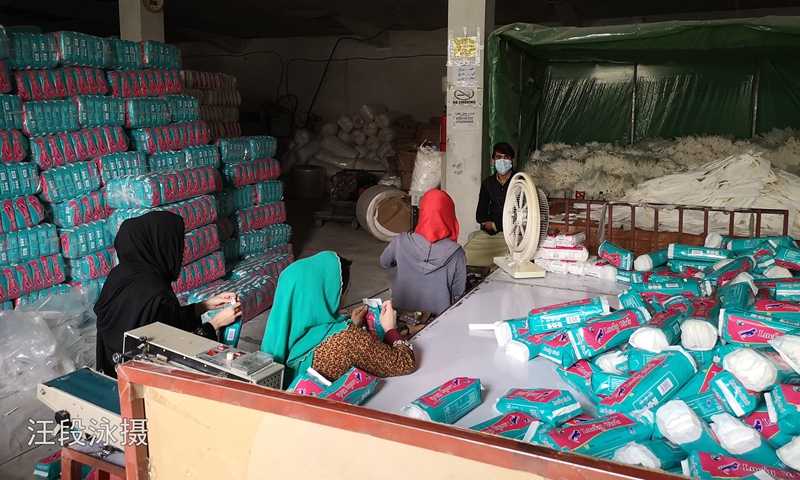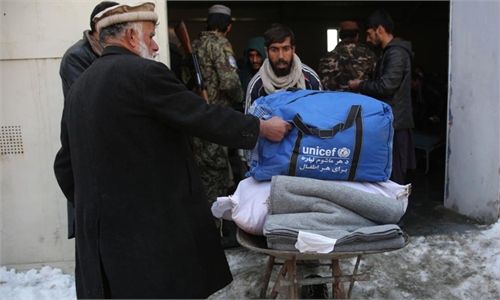Chinese scholar applauded the upturn brought by the Taliban government after visit, warning risks remained for more investment

Female workers in a factory on the outskirts of Kabul, Afghanistan Photo: Courtesy of Wang Duanyong
What is life like for the Afghan people after four months since the Taliban seized power of the country? A group of Chinese scholars and analysts concluded a field investigation and on-site inspection in Afghanistan in the end of November to learn more about how Afghanistan is facing a mounting humanitarian crisis and to further assess opportunities and risks for Chinese companies to invest.
Wang Duanyong, Associate Researcher of the School of International Relations and Public Affairs and Director of China Overseas Interests Research Center, carried out field research in Afghanistan for 29 days with his fellow visitors, covering major cities such as Kabul, Kandahar, Herat and Bamiyan, as well as some border ports, industrial parks and mining areas. In a recent exclusive interview with the Global Times, Wang suggested that security in Afghanistan is better than what he expected but the fight against terrorism is still testing the comprehensive governance capacity of the Taliban government.
China's contribution of winter supplies and infrastructure construction in Afghanistan is widely expected, Wang noted, while warning about potential risks and calling for more careful evaluation.
"Security in Afghanistan is better than I thought. Many locals, even those who are against the Taliban, all agree that security in places like Kabul has improved more than a notch since the previous government," Wang said. "The streets of Kabul are filled with armored vehicles, guns and heavily armed soldiers, and I pass through more than a dozen check points every time when I make a trip. But for foreigners, this sense of security is very complicated, and so much display of force sometimes instead brings insecurity, he highlighted.

Taliban armed forces on the streets of Kabul Photo: Courtesy of Wang Duanyong
But even so, six terrorist attacks took place in Kabul during Wang's visit, proving that counter-terrorism is still challenging for Afghanistan's intelligence, counter-terrorism and governance capabilities.
"To solve the problem of terrorist attacks, the Taliban should strengthen their intelligence capacity and network in the short term and hasten cooperation with relevant international organizations and countries. But in the longer term, it is a matter of how to promote the overall development of the country," Wang said.
The Taliban authorities said on Sunday that women can only travel short distances without being accompanied by a close male relative, media reported.
But as Wang observed, local women seem to be more independent and less restricted than expected. "In some cities I visited, I found that the percentage of women wearing the burqa was not high. Even in Kandahar, many women wore abaya or chador instead of full-body burqas. I have also seen women working in some factories and although some of them are unmarried, they are not always escorted by men."
"Currently, Afghanistan is short of adult male labor force, considering the large number of men killed or disabled in past wars. It is possible that the Taliban's acquiescence for women to work out of home independently is partly out of objective economic pressure. The Taliban's attitude towards women and other social policies remain unpredictable and need further observation."
Several of the Taliban officials Wang met during his trip were from highly educated elites and overseas returnees. "Some of the current government personnel are not strictly Taliban. Some worked with the previous government, such as traffic police, airport police and other professionals," said Wang.
The Taliban's own bureaucracy is also undergoing adjustment and refreshment. "The rector of Kabul University, for example, left when the Taliban took over power and the replacement appointed by the Taliban was originally a mullah with only seminary education. As a result, 70 faculty members signed a letter of protest and resigned. But when we visited Kabul University, we met the latest appointed headmaster who earned his doctorate in another Islamic country and taught Islamic theology and law at a prestigious university for more than a decade. Given his level of knowledge and expertise and his past weak involvement in Afghanistan, he became an ideal choice for all sides. This can be seen as an example of how the Taliban adapt and compromise in new occasions," Wang mentioned.
With millions facing starvation and nearly the entire population teetering on the brink of poverty, Afghanistan is experiencing the worst humanitarian crisis, an official of the United Nations Development Program told CNBC.
Some 23 million people are in desperate need of food, the $20 billion economy could shrink by $4 billion or more and 97 percent of the 38 million population are at risk of sinking into poverty, Abdallah Al Dardari, resident representative for the UNDP in Afghanistan, told media.
According to Wang's observation during his visit to several cities, the crisis is not caused by the lack of food and other basic necessities but by the lack of purchasing power of the residents.
On one hand, after the Taliban entered Kabul, many former government officials had lost their jobs and had no income for about five months. The existing employees were also owed wages and lived without income.
On the other hand, partly because the US has frozen nearly $9.5 billion in assets belonging to the Afghan central bank, the Taliban ordered all private and international banks to limit cash withdrawals to $20, media reported by the end of August, further inhibiting the ability to purchase, Wang told the Global Times.
"We also want to get a clear picture of the situation of the livelihood crisis in Afghanistan. We have asked several ministers for the exact number of supplies needed but none of them can give a clear picture. I do not doubt that there is a very serious food security problem in Afghanistan right now but no one has the specific numbers," Wang noted, adding that "conditions in rural Afghanistan could be worse than in the cities."
Wang and his fellow travelers also used their personal travel allowance to provide a modest help to 70 local families. With the support of businesses and enthusiasts in China, Wang and his group also collected dozens of tons of supplies in China and are trying to get them to Afghanistan.
Since the political situation of Afghanistan has changed, China announced a donation of 3 million doses of vaccines and other medical supplies. In order to help Afghanistan overcome the current difficulties, China is now accelerating the delivery of 200 million yuan ($31 million) worth of emergency assistance to Afghanistan, including food, winter supplies, vaccines and medicines, Xinhua News Agency reported.
The Global Times reported in November that Chinese firms explored lithium projects with on-site inspections in Afghanistan. However, despite growing interest , major hurdles and risks remain for Chinese firms to actually implement such projects, Wang warned, and called for more concrete risk analysis and practical plans.
Afghanistan is a landlocked country. For this reason, transnational trade is faced with problems and difficulties to transport its exports. Its shipping routes to China are not completely clear yet, Wang said.
"I've been talking to some mining experts about the exploitation of mineral deposits in Afghanistan. Some of them said Afghanistan's mineral wealth looks beautiful but its economic geography limits the value and actual benefits," Wang remarked.


